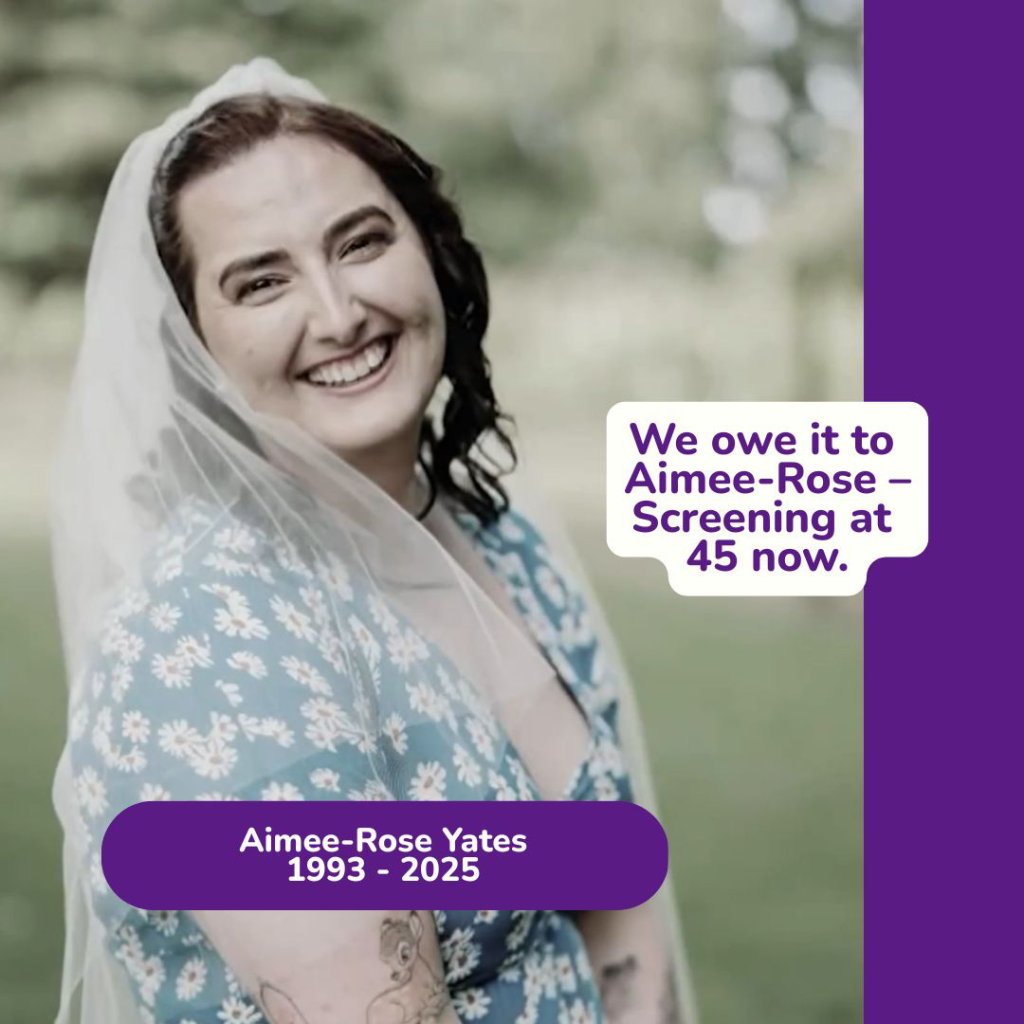Latest episode of ‘Paddy Gower Has Issues’ exposes toll of New Zealand’s outdated screening programme
Bowel Cancer New Zealand (BCNZ) is calling on the Government to urgently lower the national bowel screening age to 45, following the latest episode of Paddy Gower Has Issues.
The programme shone a light on the devastating reality of bowel cancer, centred on the story of Aimee-Rose Yates – a much-loved BCNZ ambassador who died in July 2025, aged just 32. Diagnosed with stage 4 bowel cancer at 29, Aimee-Rose fought fiercely to ensure others would not be told they were “too young” for bowel cancer. In September 2023 on national television at the leaders’ debate she asked Christopher Luxon and Chris Hipkins “if elected will you lower the screening age to match Australia?” Both leaders agreed, with Christopher Luxon describing it as a day one priority.
Her husband Aaron Yates told the programme: “Aimee-Rose asked our leaders for this change, and they promised her. She isn’t here to see it, but I’m determined her fight won’t be in vain.”
Alongside Aaron, the episode also featured bowel cancer surgeon Professor Frank Frizelle – one of New Zealand’s leading experts in early-onset bowel cancer – BCNZ Chief Executive Peter Huskinson, and Cheryl Waaka – a former Black Fern and two-time Rugby World Cup champion from Northland, who is currently facing stage 4 bowel cancer. Together, their voices painted a stark picture of why urgent change is needed.
“New Zealand has one of the highest rates of bowel cancer in the world. It’s our second-deadliest cancer – but it doesn’t have to be. Ninety percent of cases are treatable if caught early,” says Peter Huskinson. “Every month, 300 people are diagnosed and 100 die. Public Health experts at Health New Zealand report that nearly half of those deaths are avoidable – yet our government remains unwilling to commit to any firm plans to meet its pledge.”
Professor Frizelle added: “We are seeing rising numbers under 50, with a third presenting late with advanced and often incurable disease. This changing pattern of disease needs a change in our screening process.”
Cheryl Waaka’s story underscored the reality of younger New Zealanders being diagnosed late, despite being otherwise strong and active. Her journey reflects the human cost of New Zealand’s delayed screening programme.
Promises still unmet
In 2024, a petition led by BCNZ ambassador Rachael Ferguson and signed by 13,000 New Zealanders called for screening to begin at 45. Despite a costed, clinically backed proposal presented to the health minister in March, the Government last month discharged the petition without action – leaving its election pledge to match Australia’s screening age “from day one” still unmet.
This followed the cancellation of a planned rollout of screening for Māori and Pacific peoples aged 50–60, which would have offered protection to more than 100,000 people. Even the Health Minister himself has acknowledged that the move to 58 is only “a step, but not enough.”
Rachael, diagnosed with bowel cancer at just 32, says: “13,000 New Zealanders asked for this change. We gave the government evidence, costs, and accounts of the real-life impact on families – and still nothing has happened. I’m not prepared to sit back and accept continuing delays.”
The case for change
- Every month 300 Kiwis are diagnosed with bowel cancer and every month 100 people die of the disease– with 45 of those deaths avoidable
- New Zealand has 410 excess deaths each year compared to Australia, which already screens from 45
- Matching Australia’s screening age would mean one million more New Zealanders are eligible for screening protection. Current government plans to reduce the age only to 58 addresses just one tenth of this gap – and come at the cost of cancelling protection for 100,000 Māori and Pacific peoples aged 50–60
- Māori and Pasifika are hardest hit, with significantly poorer survival rates
- Screening detects cancers far earlier: 4 in 10 screening-detected cancers in New Zealand are Stage 1, compared to just 1 in 10 symptom-detected
A call to action
New ways to investigate people with symptoms to be introduced next month are expected to free up substantial colonoscopy capacity by 2026. Health NZ estimate this change will reduce colonoscopy demand for symptomatic patients by 30–60% – more than enough to enable screening at 45.
Bowel Cancer New Zealand says this creates a real opportunity for New Zealand to close the gap with Australia and save lives – but only if Government commits to a clear timeline for screening at 45. If not, the opportunity may be lost.
“With the evidence in front of us, there is no reason to wait,” says Huskinson. “Screening earlier will save lives, reduce costs, and help close a shameful survival gap faced by Māori and Pacific peoples. What we need now is action.”
BCNZ is asking New Zealanders to:
- Share the documentary to raise awareness
- Learn the symptoms of bowel cancer and talk to your GP if something doesn’t feel right
- Contact your local MP and call for screening at 45 – you can use our letter template here
Get regular updates on this campaign by signing up at bowelcancernz.org.nz

